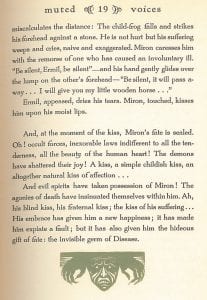“in silence is his body born again” – Muted Voices – Romanian writer Eugen Relgis
By H Dominic W Stiles, on 15 December 2017
In Glasuri in surdină, translated in 1938 as Muted Voices, Romanian writer Eugen Relgis wrote a memoir that in style seems more like a novel. Our copy is beatifully printed and bound with expressive woodcut engravings by the French artist and anarchist, Louis Moreau and translated by Rose Freeman-Ishill. Our central character is Miron, who is we might suppose Eugen himself. He describes the children playing leap-frog: 
The child-frog falls and strikes his head against a stone. He is not hurt but his suffering weeps and cries, naive and exaggerated. Miron caresses him with one with the remorse of one who has caused an involuntary ill. “Be silent, Ermil, be silent” – and his hand gently glides over the lump on the other’s forehead- “Be silent, it will pass away… I will give you my little wooden horse…”
Ermil, appeased, dries his tears. Miron, touched, kisses him upon moist lips.
And, at the moment of the kiss, Miron’s fate is sealed. Oh ! occult forces, inexorable laws indifferent to all the tenderness, all the beauty of the human heart! The demons have shattered their joy! A kiss, a simple childish kiss, an altogether natural kiss of affection…
And evil spirits have taken possession of Miron! […] the invisible germ of Disease. (p.19)
His description of illness and ‘Disease,’ make it seem like the struggles of a writhing beast –
and the carnivorous animals lodged within the body gnaw and claw and rend. […] The body bends like a bow and the blasphemies of dearth seethe in the skull. The waves make their weight particularly felt in the ears which are filled with whistlings and where cascades thunder and fall… A howling like a cataclysmic eruption, the howling of life who would not be annihilated… and the eardrums burst beneath that pressure. (p.23)
It is a powerful and strange writing style. He ends the chapter with poetic prose-
And the child regards the silence, – and the child
breathes the silence – and his life palpitates in
silence, – in silence is his body born again, –
in the umbrageous refuge of silence…
Silence… silence… silence…
 A complex and fascinating man, Relgis was born into a Jewish family in Romania in 1895, as Eisig D. Sigler, though he used various spellings of his surname and the name Eugen/Eugene. He was a part of the Romanian Symbolist movement, and although he trained as an architect he became a writer and publisher. Politically he was an anarchist, but he also had what now seem quite extreme eugenicist views, saying “Instead of natural selection, man should practice rational selection.” (see his Wikipedia page)
A complex and fascinating man, Relgis was born into a Jewish family in Romania in 1895, as Eisig D. Sigler, though he used various spellings of his surname and the name Eugen/Eugene. He was a part of the Romanian Symbolist movement, and although he trained as an architect he became a writer and publisher. Politically he was an anarchist, but he also had what now seem quite extreme eugenicist views, saying “Instead of natural selection, man should practice rational selection.” (see his Wikipedia page)
He died in Uruguay in 1987
The Gallaudet website, in a review of the anthology of deaf writers Angels and outcasts : an anthology of deaf characters in literature (1985), has this interesting comment on Miron:
Relgis’ hero, while not unique, is not really representative of the deaf majority. The deaf Steppenwolf, the lone deaf outsider, is rarely encountered in real life in the United States. In Europe and elsewhere, for historical reasons there exists a sharp cleavage between deaf intellectuals and artists and the deaf man in the street, so that there such outsiders account for a much larger proportion of the deaf population.
The book, and Relgis, are both worthy of closer inspection.
Relgis, Eugen, Muted Voices, New Jersey (1938)
http://militants-anarchistes.info/spip.php?article5046&lang=fr
 Close
Close

